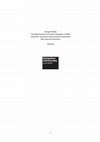Papers by Giorgi Chitidze

The Determinants of Income Inequality in OECD Countries: Theoretical and Empirical Assessment, 2015
In the last three decades or more, labour share has fallen and income inequality has risen substa... more In the last three decades or more, labour share has fallen and income inequality has risen substantially across the globe (Onaran and Galanis, 2012; Stockhammer, 2013). Wage share or labour share is the total wage income of all the workers as the ratio of Gross Domestic Product (GDP). This does not mean that real wages are falling, rather that real wages have increased at a slower pace than productivity, which is the output per labour. Of course there have been cases where real wages have fallen, particularly during the global financial crisis 2007-2009.
Since the 1980s, the world has been reshaped by the transformation in globalisation, financialisation, technological change, welfare state retrenchment and labour market institutions. So what determines income inequality in OECD countries? To answer this question, this study will be referring to the cross-section dataset of 19 advanced OECD countries from 1990 to 2007.






Uploads
Papers by Giorgi Chitidze
Since the 1980s, the world has been reshaped by the transformation in globalisation, financialisation, technological change, welfare state retrenchment and labour market institutions. So what determines income inequality in OECD countries? To answer this question, this study will be referring to the cross-section dataset of 19 advanced OECD countries from 1990 to 2007.
Since the 1980s, the world has been reshaped by the transformation in globalisation, financialisation, technological change, welfare state retrenchment and labour market institutions. So what determines income inequality in OECD countries? To answer this question, this study will be referring to the cross-section dataset of 19 advanced OECD countries from 1990 to 2007.